Psyllium husk is a fiber that’s derived from plant seeds and is used as a dietary supplement to increase fiber intake, reduce constipation and diarrhea, and even reduce your risk of heart disease.
People typically mix psyllium husk into water, protein shakes, or smoothies, but it is also available in capsule form.
Our researchers have evaluated and ranked the ten best sources of psyllium husk fiber on the market and dug into the scientific research on the benefits and side effects of psyllium husk.
Research
Rankings
1. Viva Naturals Organic Psyllium Husk
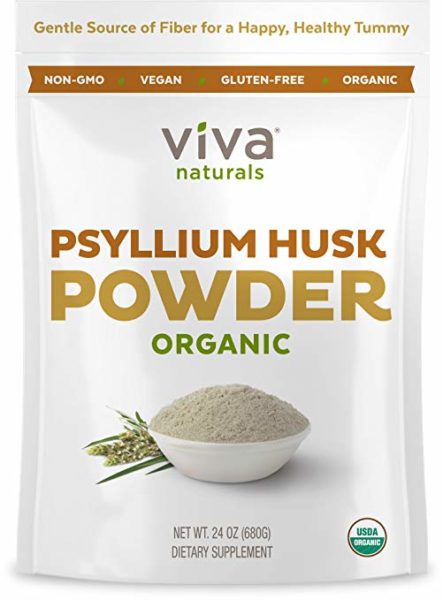
Viva Naturals Organic Psyllium Husk comes in a 1.5 pound bag of finely-ground psyllium husk fiber. The powder-form fiber supplement mixes up easily into water, shakes, and smoothies, and it’s organically grown too.
The purity and ease of use of this psyllium husk supplement make it our number one pick for a powder form psyllium husk supplements.
2. Herbal Secrets Organic Whole Psyllium Husk
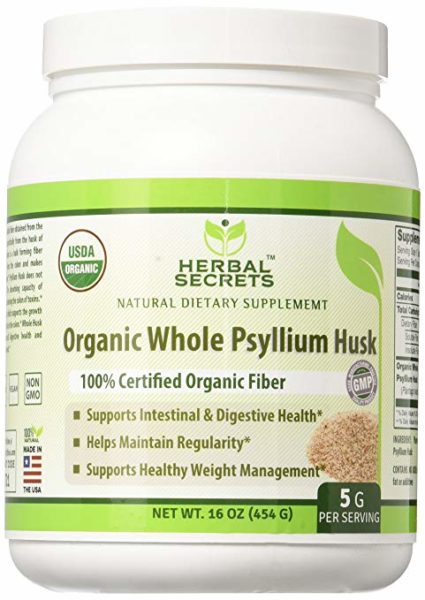
Herbal Secrets Organic Whole Psyllium Husk is a great pick thanks to its organic certification and the rigid one-pound plastic tub that the powder comes in.
The tub is easy to reseal and makes less of a mess than some of the resealable bags on the market.
True bulk users might want to opt for a larger 1.5 pound product, but for just about everyone else, this is one of the best powder form psyllium husk products out there.
3. Terrasoul Superfoods Organic Psyllium Husk Powder
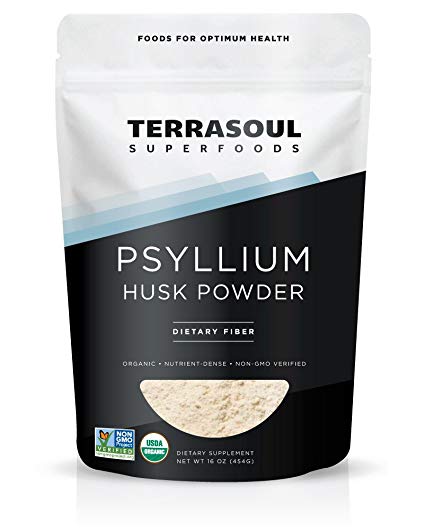
For users who go through a lot of fiber on a regular basis, Terrasoul Superfoods Organic Psyllium Husk Powder is the best option for a powder-based psyllium husk supplement.
It comes in resealable bags of up to five pounds, and it is both organically certified and ground to an extremely fine powder.
This makes it easy to mix into smoothies, shakes, or even plain water if you don’t mind the bland taste. While not everyone needs a bulk option like this, the smaller sizes are still a great option as well.
4. Anthony’s Psyllium Husk Powder
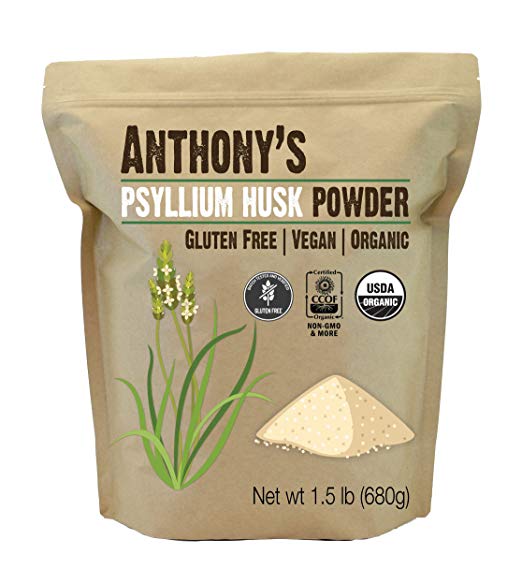
Anthony’s Psyllium Husk Powder has exactly one ingredient: organically grown psyllium husk, harvested in India. The 1.5-pound bag is great for bulk users, and as a powder-form psyllium husk supplement you’ve got the freedom to measure out any dosage you want. It’s great for boosting the fiber content of shakes and smoothies.
5. NOW Foods Psyllium Husk Caps
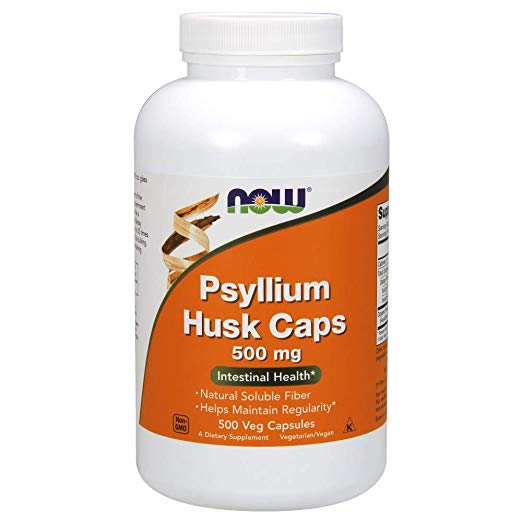
NOW Foods Psyllium Husk Caps are a capsule-based form of psyllium husks. They’re great if you can’t stand the taste and texture associated with powder-form fiber supplements.
Each cellulose-based capsule delivers 500 mg of psyllium husk, derived from organically grown plant material. There is a slight amount of stearic acid added to stabilize the capsules, but aside from that there are no ancillary ingredients, making this a solid pick.
6. Organic India Whole Husk Psyllium
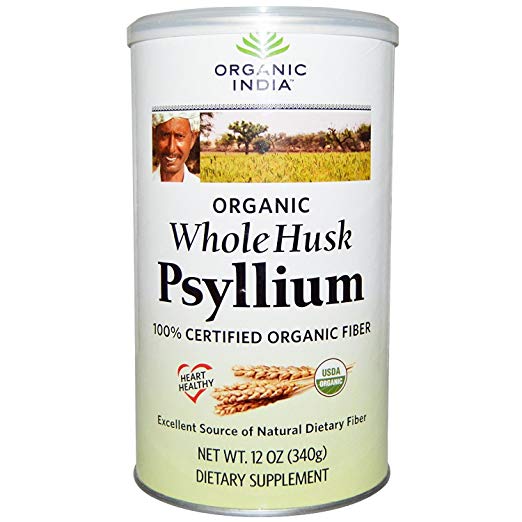
Organic India Whole Husk Psyllium is an organically grown and non-GMO psyllium husk supplement that comes in a small 12-ounce canister that makes it well-suited for people who only occasionally use psyllium husk, or who do not need large bags of fiber sitting around. Bulk users will want to look elsewhere, but for everyone else it’s a pretty good choice.
7. Healthworks Psyllium Husk Powder
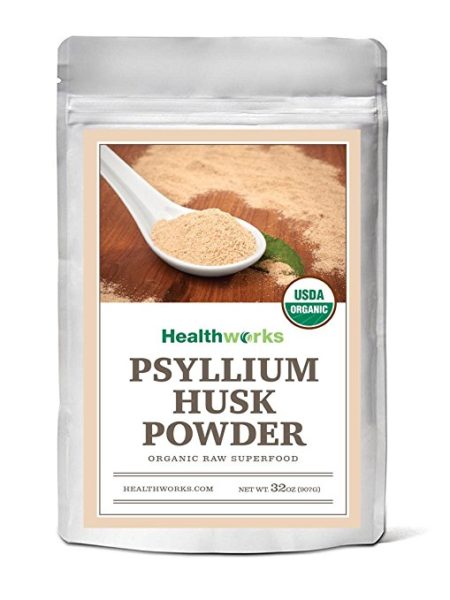
Healthworks Psyllium Husk Powder is an organically grown and certified psyllium husk powder that comes in a one-pound bag.
It’s a good option if you need a moderately large bulk amount and value the purity of an organic product. The resealable bag can make a bit of a mess if you aren’t careful, but that aside, it’s a solid pick.
8. Sunergetic Psyllium Husk
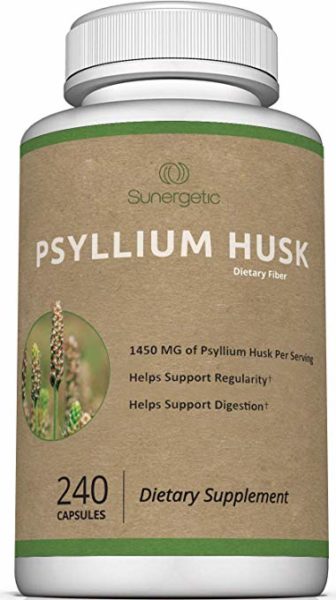
Sunergetic Psyllium Husk is a high-dose capsule-based psyllium husk supplement. Each capsule delivers 725 mg of psyllium husk in a gelatin capsule (which means this product is not suited for strict vegetarians and vegans).
Though the high dosage is great, the capsules have a couple of binders and stabilizers, like silicon dioxide, that might drive away the purists.
9. Metamucil Fiber
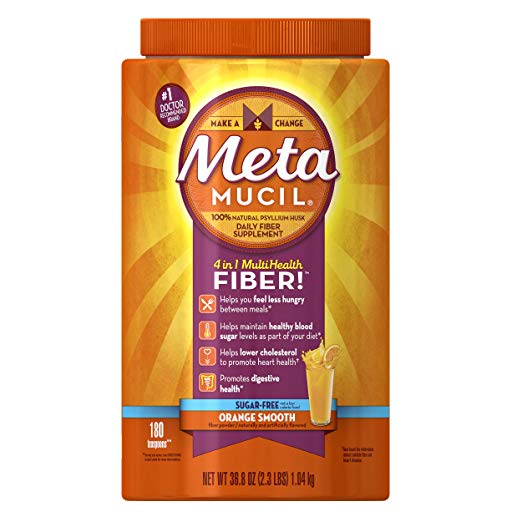
Metamucil Fiber, one of the best-known fiber supplements on the market, is in fact psyllium husk based. However, it’s not a great option from a purity perspective.
First off, the psyllium husk used in the supplement is not organically grown like that of many of its competitors.
Second, while it does have flavoring, which many other psyllium husk supplements do not, this comes at the expense of artificial flavoring and coloring agents.
It’s a decent choice if you want flavoring to mask the texture of psyllium husk, but for people who value purity there are better options out there
10. Yerba Prima Psyllium Husk Colon Cleaner
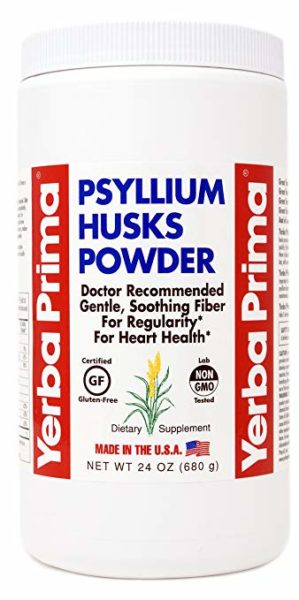
Yerba Prima Psyllium Husk Colon Cleaner is a pretty basic psyllium husk supplement. It comes in a smaller 12 ounce canister, and is finely powdered.
The primary downside is that this psyllium husk is neither organically grown nor flavored, meaning it’s outclassed by several competitors—even though it’s not an objectively bad product.
Category winners
Best psyllium husk overall: Viva Naturals Organic Psyllium Husk
For an all-natural, all-purpose source of fiber, Viva Naturals can’t be beat. Its certified organic psyllium husk is finely powdered and provides a hefty dose of dietary fiber.
Best psyllium husk for constipation: Viva Naturals Organic Psyllium Husk
For staying regular, you want to keep things simple. Viva Naturals is the way to go, because of its high fiber content and no-nonsense formulation. Simply mix it into water or juice to combat stubborn constipation.
Best psyllium husk for weight loss: Anthony’s Organic Psyllium Husk Powder
Anthony’s psyllium husk is perfect for weight loss thanks to its flexibility: this unflavored finely-ground powder is perfect for making meal replacement shakes and smoothies more filling. Fiber triggers your body’s satiety response, so the high fiber content in this psyllium husk powder is great for filling you up.
Best psyllium husk for baking: Terrasoul Superfoods Organic Psyllium Husk Powder
If you’re pumping up the fiber content of baked goods, Terrasoul is the way to go. Its bulk-sized bags and ultra-fine powder make it the perfect choice for adding fiber to your favorite recipes.
Best psyllium husk for cholesterol: Anthony’s Organic Psyllium Husk Powder
To keep cholesterol under control, boosting the fiber content of your diet is a great option. We recommend Anthony’s, thanks to its reasonable size, easy-to-mix powder, and high fiber content.
Best psyllium husk capsules: NOW Foods Psyllium Husk Caps
Don’t want to make a mess with powdered psyllium husks? NOW Foods is the best alternative. These capsule-based psyllium husk supplements provide 1.1 grams of fiber per serving (3 capsules), and serve well as a mess-free way to increase fiber intake.
Who Should Take Psyllium Husk?
Psyllium husk can be taken by persons of any age who want to treat constipation and help with irritable bowel syndrome. If you have diarrhea issues, you can also take it since psyllium husk helps to treat diarrhea.
People with heart issues or high cholesterol can also supplement with psyllium husk since it can help manage these conditions.
How We Ranked
When analyzing different products, we preferred products with natural flavoring, and ideally, little to no sugar. The original Metamucil, one of the most popular brands of fiber, didn’t make our list because of this. However, it’s sister product, the sugar-free version did, but was ranked near the bottom because it uses artificial instead of natural flavoring agents.
Products like Viva Naturals ranked higher because they emphasized naturally sweetened, zero-calorie fiber supplements that actually taste good. If a product tasted poorly, it was immediately axed from your list.
Next, we looked specifically for how the psyllium husk fiber would be delivered: whether it was powders or capsules. Powders, like Herbal Secrets, were the preferred option due to their versatility of use in shakes, smoothies, and drinks. Capsules also made the list because they tended to be more travel-friendly.
We also looked for purity. For this ranking specifically, we wanted our psyllium husk products – not meal replacement or weight gaining powders with added psyllium fiber. Anything that was not a pure fiber supplement was axed.
Benefits
Psyllium can be used as a laxative. Psyllium is a soluble fiber derived from the Plantago psyllium plant and is known for its laxative effect. The diet fibers extracted from the plant also possess pharmaceutical properties that are beneficial to other parts of the body (1).
Psyllium is being researched for its role in treating other conditions, including high total cholesterol and LDL cholesterol (“bad” cholesterol), diabetes and irritable bowel syndrome.
Psyllium helps treat constipation. Psyllium husk is considered a mild and natural laxative that facilitates digestion. Herbal laxatives are either bulk-forming or stimulating. For the same reason, it’s occasionally found in supplements used for a colon cleanse.
Bulk-forming laxatives such as psyllium come from plants with a high fiber and mucilage content that expand when they come in contact with water. As the volume in the bowel increases, a reflex muscular contraction occurs, stimulating a bowel movement (2).
Numerous human studies back psyllium’s efficacy in treating constipation. In a comparative study involving 170 participants with chronic constipation, psyllium was found to be superior to docusate sodium — a stool softener commonly used in healthcare settings (3).
Interestingly, psyllium can also be used to help treat diarrhea as explained in the next benefit.
Psyllium helps treat diarrhea. According to one study, crude extract of psyllium husk had a laxative effect in mice at 100 and 300 mg/kg, while higher doses (500 and 1,000 mg/kg), had antidiarrheal activity.
Researchers explain that when the crude extract is given to mice with constipation, it has a gut-stimulatory effect that is mediated partially by muscarinic and 5-HT(4) receptor activation; when it is administered to mice with diarrhea, it has gut-inhibitory activity possibly mediated by blockade of Ca(2+) channels and activation of NO-cyclic guanosine monophosphate pathways (4).
Psyllium should therefore be considered more of a regulatory fiber, rather than solely an anti-diarrheal or anti-constipation agent.
Psyllium helps treat symptoms of irritable bowel syndrome (IBS). Early studies show that psyllium fiber treatment reduces the number of abdominal pain episodes in those with IBS.
In one study, researchers performed a trial of 103 children with IBS. Children were assigned randomly to groups given psyllium or placebo for 6 weeks.
Children in the psyllium group had a greater reduction in the number of pain episodes than children in the placebo group; the level of pain intensity did not differ between the groups, and the percentage of stools that were normal was similar between groups (5).
The goal of another randomized controlled trial was to determine the effectiveness of increasing the dietary content of soluble fiber (psyllium) or insoluble fiber (bran) in patients with IBS.
After 12 weeks of treatment with ten grams of psyllium husk, symptom severity in the psyllium husk group was reduced by 90 points, compared with 49 points in the placebo group and 58 points in the bran group.
Early dropout was most common in the bran group; the main reason was that the symptoms of irritable bowel syndrome worsened (6).
Psyllium supplementation has also been shown to improve remission rates in those with ulcerative colitis. One study showed it to be as effective as mesalamine (medication prescribed to treat this chronic disease affecting the large intestine).
Psyllium may help lower cholesterol. In a meta-analysis of controlled clinical trials, researchers found consumption of psyllium lowered serum total cholesterol and LDL cholesterol numbers. The lowering effect was time and dose dependent; psyllium may be an adjunct to dietary therapy for the treatment of mild to moderate high cholesterol (7).
Another study showed that dietary supplementation with 6 g/day of psyllium over 6 weeks improved the fat distribution and lipid profile in a group of adolescent males at-risk of developing metabolic disease.
Metabolic disease is a group of conditions occurring together, including increased blood pressure, high blood sugar, excess body fat around the waist, and abnormal cholesterol or triglyceride levels, which greatly increase one’s risk of heart disease, diabetes and stroke (8).
At baseline, 44 percent of participants (age 15-16) were overweight or obese; twenty eight percent had decreased insulin sensitivity.
Supplementation led to a 4 percent reduction in android fat to gynoid fat ratio (fat stored in the midsection of the body versus fat that forms around the hips and thighs), as well as a 6 percent reduction in LDL cholesterol. There were no adverse reactions with supplementation.
Psyllium may help lower glucose levels in those with type 2 diabetes. Growing evidence shows that supplementation of psyllium could be an adjuvant therapy for glucose control in those with type 2 diabetes.
In a study of diabetic mice fed psyllium (as 3.2 percent of their diet) for 18 weeks, psyllium was able to reduce fasting glucose by 20 percent; there was no effect on non-diabetic mice (9).
Multiple double- and single-blind trials show that psyllium husk significantly reduces both fasting and after-meal blood sugar levels, reduces insulin spikes, decreases the absorption of glucose and reduces HbA1c. A high HbA1c means there is too much sugar in the blood.
Side effects
Using psyllium in recommended amounts appears to be safe. Psyllium may cause temporary stomach cramping, gas, bloating and intestinal discomfort.
There have been some reports of psyllium dust causing allergic skin and respiratory reactions, especially in those with severe asthma.
Sensitization to psyllium has been noted in some healthcare workers who are exposed to psyllium containing products; a history of asthma has been identified as being a risk factor.
Recommended dosage
For the treatment of constipation, a daily dose of five to ten grams of psyllium powder in water (200mL or more) is recommended. Taking psyllium with water is important to prevent the risk of it swelling and blocking the esophagus or bowels.
According to Harvard Health Publishing, the amount needed to lower cholesterol is 10 to 20 grams a day (10).
Those with IBS or diabetes should seek the advice of a healthcare professional before adding psyllium to their diet. Those who take a diuretic (water pill), warfarin (blood thinner) or Digoxin (used to treat congestive heart failure) should also consult with their physician.
FAQ
Can you mix psyllium husk powder into liquids? Yes, you can mix psyllium husk powder into any drink that is not carbonated including milk (almond, rice, coconut), water, juice, and even coconut water well. You can also add the powder to your breakfast smoothies. Since psyllium husk tends to thicken quickly, it won’t work well with warm drinks like tea or coffee.
When is the best time to take psyllium husk? The best time to consume psyllium husk is based on your goal. If you are trying to lose weight, then the best time to take the supplement is right before you eat. This will increase the content of your stomach and prevent you from eating too much by cutting your appetite. If you need some digestive help, then you might want to wait until right after you eat to take the psyllium husk. The fiber will add some bulk and help your system push the meal through your colon and digest it more quickly.
Can I feed psyllium husk to my kids? Yes, psyllium husk powder is safe for kids. Just remember that they do not need anywhere near as much as adults for a successful dosage so half a serving is more than enough to be effective.
What would happen if my pet ate some psyllium husk? If you have pure psyllium husk, then your pet is probably going to be fine. They may get a bit sick, and they may not be able to control their bathroom trips, but they should have not problem metabolizing it. If the psyllium husk isn’t pure, and it contains other sweeteners or additives, you may want to see your vet. These may have an adverse effects on your pet, similar to giving them chocolate. If you’re in doubt, call your vet to see whether the pet needs special treatment or an emergency appointment.
Can I take psyllium husk every day? Yes, psyllium husk can be consumed every day. The average adult doesn’t consume nearly the recommended daily dose of fiber, even though it’s extremely beneficial for your body.
What is fiber? Fiber is a dietary necessity that is found in a lot of foods that are good for you including nuts, grains, fruits, legumes, and vegetables. Dietary fiber can prevent inflammation in your body and push your waste through the intestines and out of the body. There are two different types of fiber – soluble and insoluble. Fiber keeps your digestive system healthy and working in peak condition. It even works as an appetite suppressant because it will fill your belly before meals, causing you to feel full quicker.
What is the difference between soluble and insoluble fiber? When people talk about soluble fiber, like psyllium husk, they are referring to the type of fiber that your body is capable of absorbing. This fiber will absorb water, get bigger, start to ferment, and eventually become a substance of high viscosity, similar to a gel. This type of fiber can be found in whole grains, legumes, vegetables, seeds, fruits, nuts, and even cereal.
Insoluble fiber is a type of fiber that does not absorb any water. This fiber is bulky and won’t get digested as it moves through your digestive tract. This is found in wheat bran, barley, germ, vegetables, legumes, and some fruits.
Why is fiber important? Fiber is immensely important to a healthy digestive system and the average adult doesn’t get enough of it in their daily diet. A lot of people labor under the misconception that fiber is just something you take when you are constipated so you can pass your stool easier. In reality, it’s a vital part of your diet since it will clean your intestines and help to eliminate any toxins that may be building up in them. It will also reduce interior inflammation, which can decrease the risk of cardiovascular disease. Psyllium husk, specifically, helps reduce cholesterol levels and support an even healthier lifestyle.
How much fiber should I be getting each day? The average adult should be consuming anywhere from 25 to 35 grams of fiber in their diet every day. This can vary a little based on your gender and how old you are. The western diet sees very little fiber in their regular food consumption, so more might be necessary (10). Make sure that your diet contains a lot of plant foods like psyllium husk supplements, vegetables, nuts, fruit, beans, and whole grains to ensure adequate fiber intake.
Is psyllium husk only for older people? No, the idea that only older people need fiber because they have more difficulty passing healthy stool is a fallacy. All adults whose diets do not contain enough natural fiber would benefit from psyllium husk supplements in their diet to ensure they’re taking in enough fiber (11). As we mentioned, fiber serves a lot of different functions when it comes to digestive health – it’s not just for constipation.
How long does psyllium husk stay fresh? On average, psyllium husk has a 2-year shelf life but make sure that you check the recommendation of your package. Each supplement should come with an optimal freshness date, but the differences in additives, sweeteners, and packaging may affect the average shelf life.
How much psyllium husk should you take for adjunctive therapy of type 2 diabetes? For adjunctive therapy of type 2 diabetes 6.8 to 13.6 g of psyllium husk, split between 2 doses should be taken every day.
How much psyllium husk should you take for the reduction of coronary heart disease? For the reduction of coronary heart disease at least 10.2 g of psyllium husk should be taken every day.
Can I swallow psyllium husk dry, or eat it whole? It is usually unwise to swallow psyllium husk dry since it absorbs water as it goes down your throat. This will cause it to expand too soon, and potentially cause you to choke. This is why most brands recommend mixing it entirely into a liquid, so it goes down safely and expands where it is supposed to – in your intestines.
Can high fiber symptoms be relieved? Yes, it can be relieved by drinking plenty of water, and avoiding high-fiber foods for a bit. If you experience constipation, bloating, or abdominal discomfort, this could be a sign of a high-fiber supplement that has gone wrong and you should take the necessary steps.
How does psyllium husk come packaged? Psyllium husks usually come as whole husks or as ground powder. Both of them have the same benefits to your health, so there is no specific advantage in one form over the other (12). It is entirely up to your personal preference, so choose whichever form is more convenient for you.
Should I take enough to get me to the recommended fiber dose right away? Fiber is something that most diets see very little of, and introducing too much of it at a time can make your stomach and intestines miserable. We recommend that you start slowly and and gradually increase the amount of fiber you take until you reach the recommended psyllium dosage.
How else can I use psyllium husk? Psyllium husk fibre can be used in baking since it’s a popular ingredient to use as a binding agent in these baking substitutes. For example, a lot of low carb or gluten-free diets will substitute their flours and sugars with whole wheat flours and Splenda or other substitutes. It’s also a great way to make your Paleo and Keto treats taste better.
Is a high fiber okay during pregnancy? Fiber helps to not only ensure a healthier baby but also helps the mother maintain consistent digestive health. Eating a mix of fibers during pregnancy is safe and also highly recommended.
Can high fiber diets help prevent diverticulosis? Yes, high-fiber supplements produce healthier stools which allows for easy movement through the bowel. Diverticula formation may be reduced or possibly stopped with a diet consisting of food and supplements that aids in healthy stool production.
Which type of fiber is best? Fibers that are soluble, viscous, and fermentable appear to be the healthiest options including vegetables, fruits, oats, legumes, or even chia seeds.
How much psyllium husk should you take for constipation in adults? Adults suffering from constipation should consume 2.5 to 30 g/day divided in a few doses.
How much psyllium husk should children take for constipation? In children age 6 to 11 years old 1.25 to 15 g/day in divided doses is the correct protocol.
How much psyllium husk should you take for irritable bowel syndrome? For treating irritable bowel syndrome, 10 g/day of psyllium husk should be consumed over 1 or 2 doses.
Does psyllium husk help with weight loss? Soluble fiber, like psyllium husk, may help women burn fat by reducing how many calories they absorb from food. One study involving 17 people found that people who ate the most fiber absorbed fewer calories and fat from their food (13).
Is psyllium husk a prebiotic? Psyllium is not considered a prebiotic, but is considered to have prebiotic-like effects since a small portion of psyllium fibers can be fermented by intestinal bacteria.
What is psyllium made from? Psyllium is made from the seed husks of the plantago ovata plant.
How much soluble fiber is in psyllium? About 70% of the fiber found in psyllium powder is soluble. The remaining amount is insoluble and helps to keep you regular.
What is another name for psyllium? Psyllium often goes by the other name ispaghula.
What is the point of a bulk forming laxative? A bulk forming laxative, like psyllium, soaks up water in your gut to help make your bowel movements smoother. Bulk forming laxatives can be used on going, or one time, depending on the needs of the person. The best part of a bulk forming laxative, is that it accomplishes all this, without increasing flatulence. Furthermore, psyllium husk can soften your stools to help deal with issues like constipation. This can also help prevent other more dangerous issues like fissures and haemorrhoids.
Does psyllium husk help manage cholesterol? Yes, psyllium husk has been shown to help people manage their cholesterol levels and lower their risk of heart disease.
What are the side effects of psyllium husk? Since psyllium is a digestive aid, it may cause temporary IBS-like effects such as stomach cramping, gas, bloating and intestinal discomfort. Psyllium husk dust may also cause allergic skin and respiratory reactions in persons with asthma.
Is high fiber good for pregnant women? Yes, high fiber supplements, like psyllium husk are great for women since one of the most common symptoms that can occur during pregnancy, is constipation. During pregnancy, several hormones secreted that help the fetus develop, also slow down digestion, which can really cause a back up of waste in the large intestine and colon. According to the American Pregnancy Association should consume 25 – 30 grams of fiber per day, ideally from natural food sources.
Related Articles
Recap
Psyllium husk is soluble fiber taken primarily for the treatment of gastrointestinal motility disorders such as constipation and diarrhea.
It is derived from the Plantago psyllium plant, and the diet fibers extracted from the plant also possess pharmaceutical properties.
It is being studied for its ability to treat symptoms of IBS as well as its efficacy in lowering LDL cholesterol and glucose levels in those with type 2 diabetes.
For BodyNutrition’s #1 collagen peptide recommendation, click here.